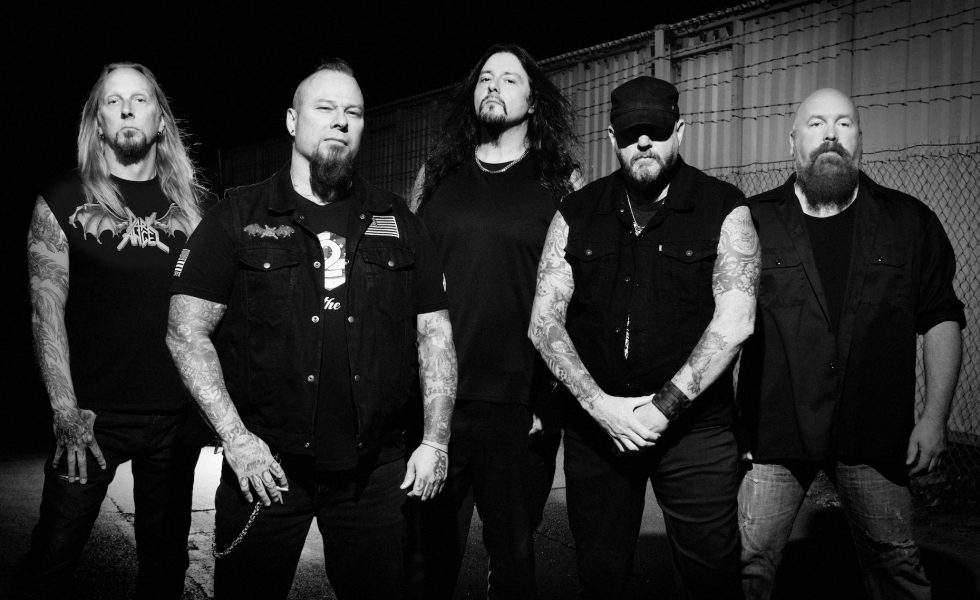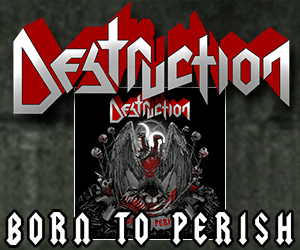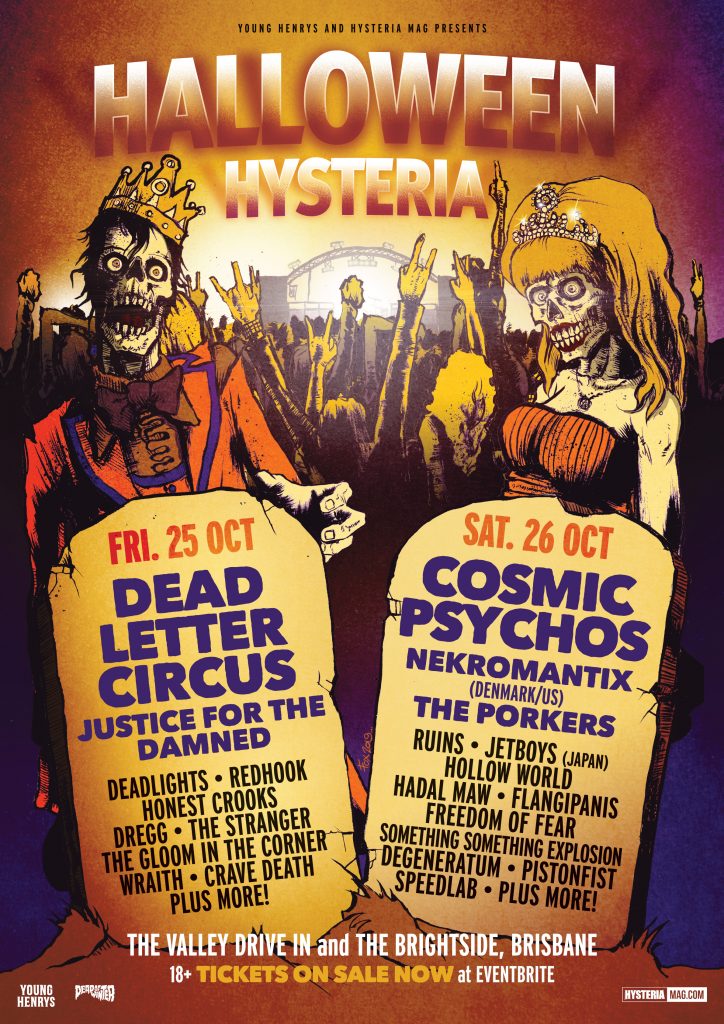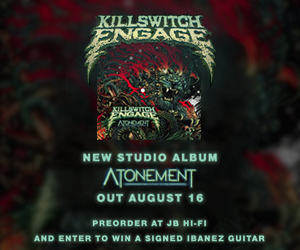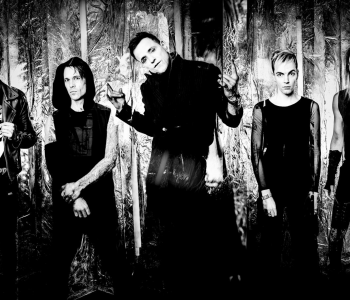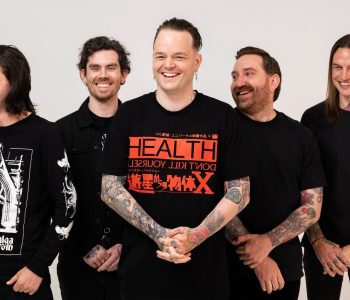Korn‘s Jonathan Davis was so excited by ORGY that he created his own record label …
When it comes to drum legends in metal, there are few bigger names than Gene Hoglan. His technical timekeeping prowess has earned him the reputation as a human drum machine with close to fifty recording credits under his belt. Stints with some of the most well known names in metal have brought him to Australia many times during the last twenty years as a member of Testament, Fear Factory, and Strapping Young Lad.
MORE: CARNIFEX: Visceral Dystopia REVIEWS: FREEDOM OF FEAR: Nocturnal Gates // THY ART IS MURDER: Human Target // CARNIFEX: World War X // SLIPKNOT: We Are Not Your Kind
This September, Hoglan will be on tour in Australia once again, this time with the band that started his push into worldwide recognition. Reforming for the second time in late 2017 after a break of almost seven years, LA thrash unit Dark Angel will be visiting these shores for their first ever tour.
“It’s a monument for Dark Angel,” Hoglan says. “It will be our first time down there and we’re all super excited. I know the guys are all champing at the bit. I am too. I love Australia, and it’s been four or five years since I was there. I’ve probably been there upwards of 20 times now.”
One of the founding members of thrash and a vanguard of the genre’s second wave, the original version of Dark Angel formed in 1981 and established themselves in the thriving west coast metal underground as a speedy thrash band. In late 1986, the same year as seminal thrash masterpieces Reign in Blood and Master of Puppets were released, Dark Angel’s second album Darkness Descends appeared. It was Hoglan’s first record with the band, and is held up to this day as their best work. It took thrash in new directions, in terms of both speed and structure, and lyrically. As a songwriter, Hoglan was getting his lyrical inspiration from what he saw around him on the streets of LA, things he felt were far scarier than the average metal fare.
“When I was writing lyrics for Dark Angel,” he says, “a lot of bands were writing about nuclear war, and jumping in the pit, and killing somebody with a rusty knife, and whatever Satanic themes that were bouncing around at the time. And I always felt that reality was way darker than singing about Satan or being a serial killer, or something. I thought that reality was a lot more darker than what was currently being presented. When you’re living in LA and you see the reality of LA and spending time across the States and seeing the darkness and the reality that exists in society, I can get behind writing about that, as opposed to something I don’t have a fear of. Nuclear war? I had no fear of nuclear war. I was like, ‘We’re never going to have a nuclear war’, and sure enough, thirty years later…” He chuckles grimly. “That’s a fantasy subject for me! Back in 1985, 86, that was a popular concept for a lot of bands, but it was fantasy for me. But a child molester – that’s real. A female being raped – that’s real.”
I thought that reality was a lot more darker than what was currently being presented. When you’re living in LA and you see the reality of LA and spending time across the States and seeing the darkness and the reality that exists in society, I can get behind writing about that, as opposed to something I don’t have a fear of. Nuclear war? I had no fear of nuclear war.
[GENE]
What cemented Dark Angel’s cult appeal, however, was the speed of their music. As fast as the other California thrash bands were, Dark Angel played at clock-melting tempos; on stage they were faster still. Not long after joining the group, Hoglan had a moment of clarity that would change their approach from then on – speed wasn’t everything.
“When I first joined the band, and all the way up to just before Darkness Descends… Darkness Descends was us on heroin compared to the speed we could play those songs at! I mentioned earlier today in another interview that just because you can play songs faster, doesn’t necessarily mean you should. I didn’t know that when I was a kid. All I knew was, you play as fast as you can up on stage. You get up on stage and you play as fast and as hard as you can. And then you watch the videotape later and you think ‘Jesus! I had no idea we were playing that blazingly fast!’ Songs like Burning of Sodom and Darkness Descends on that album are slow – like Black Sabbath slow – compared to how we play it live. It kind of sounds like an unmitigated mess. So that’s when I sort of grew up a little bit. I got a bit wiser as a musician and I knew just… that because you can play at the absolute peak of your tempo doesn’t mean you should.”
Evolving concurrently with thrash was a genre for which, at the time, speed and extremity indeed was everything – death metal was in its infancy, an even more underground movement spearheaded by San Francisco’s Possessed and Hellhammer from Switzerland. The drummer is more than happy to give us history lesson.
“Death metal started coming about in very, very late 84. And you got bands like Possessed, and Hellhammer, and bands like that, and you had some of the super underground bands from Europe like Semen of Satan and (German band) Poison and from the States. You had kind of novelty bands like Intense Mutilation, where death metal became such a parody of itself that by 86, early 87, it had flashpointed, flamed out and went away just as quickly because it didn’t look like there was anything new being brought to the table. Even Possessed started augmenting their imagery so you had songs like Confessions and My Belief and things like that on The Eyes of Horror EP.”
At almost exactly that time, Florida musician Chuck Schuldiner emerged with his band. Simply named Death, Schuldiner took that raw, unformed energy and transformed it into a legitimate musical genre. Gene Hoglan joined Death in 1993, following the dissolution of Dark Angel,. He contributed to the albums Individual Thought Patterns and Symbolic. While Schuldiner was often credited with inventing death metal, Hoglan explains that the guitarist, who died of cancer in 2001, never believed that himself.
“Death kind of rejuvenated the death metal genre, so much so that Chuck was being credited for creating death metal. And I know Chuck never bought into that. He would say, ‘Hey I didn’t create this. There were other guys doing this before me, and a lot of bands doing this, but this is my take on the genre and I’m trying to be as brutal as I can be, but I did not create this’. Chuck was never comfortable with the tag Godfather of Death Metal.”
Hoglan’s tenure in Death elevated his reputation beyond the underground, and his next band was Strapping Young Lad. Since then he’s recorded or played live with more than 20 other acts including Testament, Fear Factory, Dethklok, Pitch Black Forecast, Meldrum, Zimmer’s Hole and Forbidden. It’s all part of the plan he envisioned when he was still a boy.
“I’m a very good focuser on getting what I want,” he says. “There’s this thing called visualisation, you visualise it and you manifest it and make it happen… I had no idea that that’s what I was doing from age 11. From when I was 13, I knew I wanted to be in a rock band, I wanted to be a professional drummer, tour the world, see the world, I want to entertain people. I started developing that very early on, and I was autistic on my focus on that. I didn’t do drugs or drink, all that much, at all in Dark Angel. I was a focused, sober young guy who wanted to learn this industry, so I decided I better arm myself with the skills to navigate this industry, because this industry’s a fucker, I tell you that. I don’t want to be one of those old, grizzled, bitter, veterans. I always want to maintain a youthful exuberance for this.”
That knowledge and sobriety has helped him steer a course through a tough business. He admits that, early on, he got a few knives in the back, but his diligence and wisdom has helped him rise above that and given him the kind of opportunities that many others only dream about.
“Even during the early days, there was something in the back of my mind saying, ‘Hey, bands break up. Styles of music change. Gene, you’re 19 years old, in Dark Angel – your band – but this might not be your only band. There’s a good possibility that you are going to carry on doing a lot of stuff with a lot of different people, and being a part of a lot of different bands’. I was always able to go with the flow. I jumped in the deep end and I let it carry me wherever it did and I got to play with a lot of amazing musicians. Chuck Schuldiner, Bobby Colville, Devin Townsend, Jed Simon, Byron Stroud, the guys from Testament, Dethklok, Brendon Small… I get to play in a band with my wife Laura Christine, who is an amazing guitarist. I’ve gotten to do all this stuff. I am very fortunate.”
Catch Dark Angel at the following dates:
BRISBANE // Wednesday 25 September // The Zoo
SYDNEY // Thursday 26 September // Manning Bar
MELBOURNE // Friday 27 September // Max Watts
ADELAIDE // Saturday 28 September // Enigma


